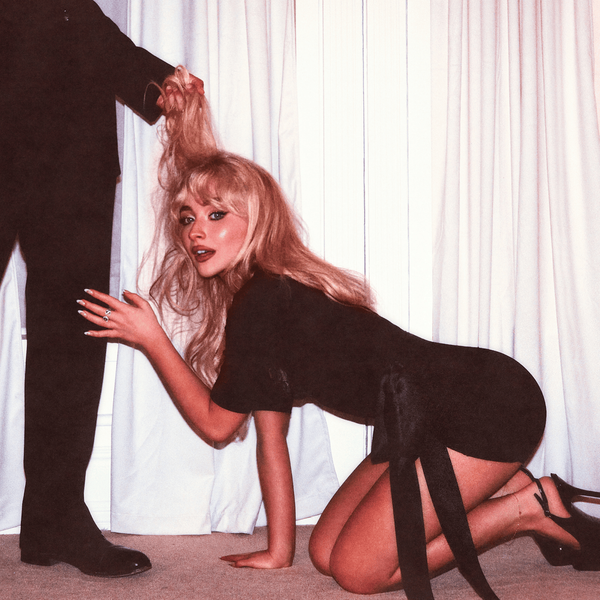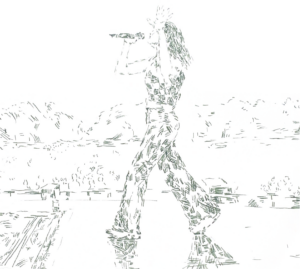The internet was divided (to say the least) the week of August 11, when Sabrina Carpenter announced the release of her seventh studio album, Man’s Best Friend (2025). To be more specific, there was outrage—quickly met with defense—over its cover: Carpenter in a little black dress and heels, on all fours, with a faceless man tugging on her hair, as if she were a dog on a leash.
The image set off a fierce debate. To some, it was a degrading depiction of women as submissive to men. To others, it was a tongue-in-cheek feminist statement on women’s sexuality. According to either side, the other was a sign of the global culture’s creep toward conservatism. With such intense backlash, many were hoping that the album itself would contextualize the cover and title. Perhaps it would contain scathing analyses of how men view Carpenter as a sexual object, or maybe one of the songs would be a commentary on the labelling of women as “bitches.”
In actuality, the album delivers none of that. It isn’t a grand, radical manifesto about sexual freedom, nor is it a full-blown degradation of Carpenter’s dignity as a woman. It’s simply a face-value pop album of fun, groovy disco songs that vary in quality and lean heavily into Carpenter’s assumed persona: hot, witty, and horny.
What’s missing, however, is the cleverness that helped carve Carpenter’s niche in the music industry. Her previous work—emails i can’t send (2022), Short n’ Sweet (2024), and even her famous Nonsense outros—was a strong display of songwriting and comedy prowess. Her use of innuendo was pointed and deliberate, and that’s what made it so compelling. On her latest record, it seems this skill is gone, traded in for an indiscriminate raunchiness that reduces Carpenter to an over-exaggerated caricature and loses sight of what made her original schtick so effective.
The clearest demonstration of this change lies in the song “Tears.” The premise frames basic household contributions, such as doing the dishes or assembling furniture, as major turn-ons. Poking fun at Carpenter’s ever-deteriorating standards for potential partners, she sings, “I get wet at the thought of you / Being a responsible guy / Treating me like you’re supposed to do / Tears run down my thighs.” Despite the intended playful tone, the lyrics feel underworked, with many lines awkwardly squished in to fit the melody.
Additionally, compared to the innuendos in her previous work, the sexual references in “Tears” come across more blunt and off-putting than sharp and cheeky. There’s a lack of subtlety in the way she sings about “[getting] wet” and “tears [running] down [her] thighs” that creeps into territory of making listeners uncomfortable or being just plain crude. This becomes apparent when set against some of her most overtly sexual tracks from Short n’ Sweet. Songs like “Juno” and “Bed Chem” are undeniably R-rated, but they reserve the most explicit lyrics—“Have you ever tried this one?”—for the second verse or bridge, allowing tension to build and the punchline to land with impact.
However, the song redeems itself, at least partially, through its production. It’s funky, danceable, and overflowing with disco flourishes, reminiscent of bands like the Bee Gees or Earth, Wind & Fire (whom she brought out during her Lollapalooza headlining set this past summer). This pattern of instrumentation outpacing the writing is a trend that carries throughout the album. “When Did You Get Hot?” is another example; the song embraces a sultry R&B style that highlights Carpenter’s vocal agility, but its weak lyrics keep it from fully landing.
Of course, pop music doesn’t have to be masterfully written to have merit. In fact, many exceptional pop songs thrive on sheer catchiness, so much so that the lyrics become secondary. “House Tour” belongs in this category; while its lyrics are actually sharper than many of the others on the album, it stands out the most for its shimmering synth-pop hook. The chorus, where she playfully invites a date to spend the night under the guise of a “house tour,” is a pure earworm that leads into an equally infectious outro: “My house is on Pretty Girl Avenue / My house was especially built for you / Some say it’s a place where your dreams come true / My house could be your house too.”
The final track, “Goodbye,” is another highlight. The song draws clear inspiration from ABBA, with a vibrant blend of horns, piano, and other live instrumentation, as well as small interjections before the pre-chorus that sing, “Aha, aha.” The sound is triumphant and lively, closing out the album on a high note.
Unfortunately, these standouts are an exception rather than the rule. Many of the tracks, particularly in the front half of the record, are lackluster, with several songs blurring into one another. Songs like “My Man on Willpower,” “Sugar Talking,” and “Don’t Worry I’ll Make You Worry” lack the melodic punch necessary to leave an impression that lasts the length of the album. In fact, only slightly more than half of the album is memorable in any significant capacity, with the rest coming across as boring or half-baked. Considering that Man’s Best Friend was released barely a year after Short n’ Sweet, with a full arena tour occupying the gap, it’s unsurprising that the album feels rushed and underdeveloped.
Despite its handful of highlights, Man’s Best Friend is an underwhelming effort. It combines the weakest parts of Short n’ Sweet with none of the best parts of emails i can’t send, resulting in a record that clearly could have benefited from more time in the studio. The lyrics are often mindlessly provocative, almost designed to be clipped for social media, which may also shed light on the shock-value album cover.
In truth, the record feels like a key crossroads in Carpenter’s career: she can release another album of shallow pop songs that continue transforming her persona into a one-note brand, or she can take a step back, write with care, and come out the other end with a new project that is still fun, still dirty, but ultimately pointed and purposeful.
Voice’s Choices: “Nobody’s Son,” “House Tour,” “Goodbye”







